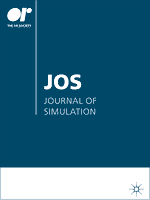
Journal of Simulation
Scope & Guideline
Innovating Insights in Industrial and Manufacturing Engineering
Introduction
Aims and Scopes
- Discrete Event Simulation (DES):
The journal consistently publishes research on discrete event simulation, which is used to model and analyze systems where events occur at discrete points in time. This approach is applicable in various fields such as healthcare, logistics, and manufacturing. - Agent-Based Modeling (ABM):
A significant focus is on agent-based modeling, which simulates the actions and interactions of autonomous agents to assess their effects on the system as a whole. This methodology is prevalent in studies related to social dynamics, supply chain management, and resource allocation. - Hybrid Simulation Techniques:
The integration of different simulation methodologies, such as combining DES with system dynamics or optimization techniques, is a recurring theme. This hybrid approach enhances model accuracy and applicability across diverse scenarios. - Optimization in Simulation:
Many papers emphasize optimization techniques within simulation frameworks, aiming to improve system performance and decision-making processes. This includes the application of algorithms for resource management and operational efficiency. - Digital Twins and Real-Time Simulation:
The journal explores the concept of digital twins, which are virtual representations of physical systems, to enable real-time monitoring and optimization. This emerging area reflects a growing trend towards integrating simulation with IoT and data analytics. - Sustainability and Resilience Modeling:
Research also focuses on modeling sustainability and resilience strategies in various sectors, including healthcare, supply chains, and urban planning, highlighting the importance of adaptive systems in the face of challenges.
Trending and Emerging
- Integration of Machine Learning with Simulation:
Recent publications show a significant increase in the integration of machine learning techniques with simulation models, enhancing predictive capabilities and decision-making processes in various applications. - Real-Time and Predictive Simulations:
There is a growing interest in developing real-time simulations and predictive models, particularly in healthcare and urban planning, to facilitate immediate decision-making and resource allocation. - Sustainable and Resilient Systems Modeling:
Emerging studies emphasize the modeling of sustainable and resilient systems, reflecting a global focus on sustainability and the need for adaptive strategies in supply chains, healthcare, and urban environments. - Digital Twins and Smart Systems:
The concept of digital twins is gaining traction, with research exploring their application in monitoring and optimizing complex systems in real-time, particularly in manufacturing and healthcare sectors. - Complex Network Analysis in Simulation:
An uptick in research using simulation to analyze complex networks, such as social networks or supply chains, is evident. This trend highlights the importance of understanding interactions within systems to improve resilience and efficiency.
Declining or Waning
- Traditional Statistical Methods:
There has been a noticeable decrease in the publication of papers solely focusing on traditional statistical methods for simulation analysis, as more researchers adopt advanced computational techniques and machine learning approaches. - Simple Scenario-Based Simulations:
The journal has seen fewer studies that rely on basic scenario-based simulations without integration of more complex modeling techniques, indicating a shift towards more sophisticated and multi-dimensional simulation frameworks. - Single-Domain Focus Studies:
There is a decline in research that focuses solely on single-domain applications of simulation. The trend is leaning towards interdisciplinary studies that combine insights from multiple fields to address complex problems. - Physical System Simulations:
Research centered on physical system simulations, such as mechanical or electrical systems without integration with digital technologies, has decreased, possibly due to the growing emphasis on digital transformation and smart systems. - Static Models without Real-Time Data Integration:
There is a reduced frequency of publications focusing on static models that do not incorporate real-time data or adaptive algorithms, as the field moves towards dynamic and responsive simulation environments.
Similar Journals

SIMULATION MODELLING PRACTICE AND THEORY
Bridging Theory and Practice in the World of Simulation.SIMULATION MODELLING PRACTICE AND THEORY is a leading academic journal published by Elsevier that focuses on the dynamic and evolving fields of simulation modeling and its applications across various disciplines. Established in 2002, this journal has rapidly gained recognition within the academic community, achieving a prestigious Q1 ranking in both Hardware and Architecture, as well as Modeling and Simulation for 2023. With an impressive impact factor that reflects its significance, it offers essential insights and findings pertinent to researchers, professionals, and students alike. The journal's scope encompasses a wide array of topics, encouraging interdisciplinary collaboration and innovation. Open access options further enhance visibility and accessibility of published research, contributing to the dissemination of knowledge in this critical field. Operating from its base in Amsterdam, Netherlands, SIMULATION MODELLING PRACTICE AND THEORY continues to provide a vital platform for advancements in simulation methodologies and applications, fostering an environment where theoretical principles and practical implementation converge.
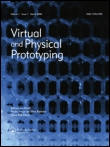
Virtual and Physical Prototyping
Innovating Design Through Cutting-edge ResearchVirtual and Physical Prototyping is a premier scholarly journal published by Taylor & Francis Ltd, which has established itself as a leading platform for innovative research in the fields of Computer Graphics, Computer-Aided Design, Industrial and Manufacturing Engineering, Modeling and Simulation, and Signal Processing. Since its inception in 2006, the journal has gained significant recognition, currently ranked in the Q1 quartile in multiple categories, reflecting its high impact and rigorous standards of scholarship. Now an Open Access journal as of 2023, it provides a unique opportunity for researchers, professionals, and students to share their work widely and engage with a global audience. With its strategic emphasis on the convergence of virtual and physical prototyping technologies, this journal contributes vital knowledge and insights that drive innovation and development in manufacturing processes and design methodologies. Located in the United Kingdom, its comprehensive approach to both theoretical and practical aspects of prototyping ensures that it remains an essential resource for advancing the respective fields it represents.
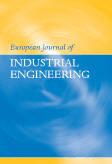
European Journal of Industrial Engineering
Fostering Innovation in Supply Chain ManagementEuropean Journal of Industrial Engineering, published by INDERSCIENCE ENTERPRISES LTD, stands as a significant platform within the field of industrial and manufacturing engineering, with a commendable impact factor reflecting its academic rigor and relevance. The journal, recognized in the 2023 Q2 category, encourages innovative research and practical applications that are critical to advancing the discipline, drawing insights from global scholars and practitioners. As of 2023, it ranks #183 out of 384 within its Scopus category, placing it within the 52nd percentile, a testament to its emerging influence in the scholarly community. Although currently not Open Access, the journal spans a dedicated timeframe from 2007 to 2024, with an expansive scope that encompasses various facets of industrial engineering, including optimization, production systems, and supply chain management. Positioned in the United Kingdom, the journal not only aims to foster knowledge sharing but also to bridge the gap between theoretical advancements and real-world applications, making it a valuable resource for researchers, professionals, and students alike.

Jordan Journal of Mechanical and Industrial Engineering
Exploring the Frontiers of Mechanical and Industrial EngineeringThe Jordan Journal of Mechanical and Industrial Engineering, published by HASHEMITE UNIVERSITY, is a distinguished platform for disseminating research in the fields of mechanical and industrial engineering. Established in 2009, this journal has made significant strides in contributing to the body of knowledge within its scope, as evidenced by its current Q3 ranking in both Industrial and Manufacturing Engineering and Mechanical Engineering categories for 2023. Researchers and practitioners alike can benefit from the journal's focus on contemporary developments, innovative methodologies, and empirical investigations that address real-world challenges. While the journal operates under a traditional publishing model, it remains committed to enhancing the dissemination of knowledge through accessible research findings. Scholars will find value in the journal’s insights, as it garners attention within Scopus, ranking as #195 in Industrial and Manufacturing Engineering and #380 in Mechanical Engineering. With its address located at the Deanship of Academic Research & Graduate Studies, PO Box 330127, Zarka, Jordan, the journal serves as a vital resource for the academic community seeking to advance their expertise in engineering disciplines.
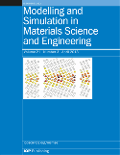
MODELLING AND SIMULATION IN MATERIALS SCIENCE AND ENGINEERING
Unveiling the Mechanics of Material PerformanceMODELLING AND SIMULATION IN MATERIALS SCIENCE AND ENGINEERING, published by IOP Publishing Ltd, serves as a vital resource for researchers, professionals, and students engaged in the multifaceted fields of materials science, condensed matter physics, and computational mechanics. Since its inception in 1992, this journal has been committed to advancing knowledge through high-quality research articles, reviews, and simulations that explore complex interactions within materials. With an impressive Scopus rank in multiple categories, including Q2 in Materials Science and Mechanics of Materials, it reflects its significant influence and relevance in the academic community. Though not an open-access journal, it provides critical insights and developments in modeling techniques and simulations aimed at improving material performance and understanding thermodynamic processes, making it an essential read for those at the forefront of materials innovation. As it continues to expand its scope and reach into 2024 and beyond, MODELLING AND SIMULATION IN MATERIALS SCIENCE AND ENGINEERING remains a key platform for disseminating groundbreaking research that shapes the future of the discipline.

Frontiers in Mechanical Engineering-Switzerland
Connecting Ideas and Innovations in Mechanical EngineeringFrontiers in Mechanical Engineering-Switzerland, published by FRONTIERS MEDIA SA, is a pioneering open-access journal that has been fostering innovations in the field of mechanical engineering since its inception in 2015. Based in Switzerland, this journal provides a robust platform for disseminating cutting-edge research across multiple disciplines within mechanical engineering, including materials science, industrial and manufacturing engineering, and computer science applications. With impressive Scopus rankings, including Q2 statuses in key categories such as Industrial and Manufacturing Engineering and Mechanical Engineering, it stands out as a valuable resource for researchers and practitioners aiming to stay abreast of trends and breakthroughs in these fields. By embracing open-access principles, the journal ensures that high-quality research is readily available to a global audience, thereby promoting collaboration and knowledge sharing. As it continues to grow, Frontiers in Mechanical Engineering is poised to make significant contributions to both academic and professional communities, enhancing understanding and advancing practices in engineering disciplines.

Results in Engineering
Connecting Global Minds in Engineering Research and InnovationResults in Engineering is an esteemed open-access journal published by Elsevier, dedicated to advancing the field of engineering through high-quality, innovative research. Since its inception in 2019, this journal has rapidly established itself within the academic community, evidenced by its prestigious Q1 ranking in the Engineering (miscellaneous) category for 2023 and a remarkable ranking of #54 out of 307 in General Engineering according to the Scopus database, placing it in the 82nd percentile of its category. Located in the Netherlands, Results in Engineering provides a global platform for researchers, professionals, and students to disseminate their findings and foster collaboration across diverse engineering disciplines. The journal's commitment to open access ensures that valuable research is accessible to a wider audience, fostering innovation and knowledge sharing. With a progressive approach to publication, Results in Engineering seeks to enhance the engineering landscape by publishing cutting-edge studies that address contemporary challenges and solutions in the field.
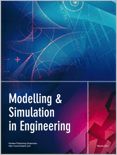
Modelling and Simulation in Engineering
Bridging Theory and Practice in Engineering ExcellenceModelling and Simulation in Engineering is a pioneering open-access journal, published by HINDAWI LTD, and established in 2007. With a focus on advancing the fields of engineering, computer science applications, and modeling and simulation, this esteemed journal serves as a vital platform for researchers, professionals, and students alike. The journal has made significant strides in its academic contributions, reflected in its current categorization within the Q3 quartile in Computer Science Applications, Engineering (miscellaneous), and Modeling and Simulation as of 2023. With a Scopus ranking of 133 out of 307 in General Engineering and 183 out of 324 in Mathematics' Modeling and Simulation, it emphasizes the crucial interplay between theoretical research and practical applications. Each article published in Modelling and Simulation in Engineering undergoes a rigorous peer-review process, ensuring high-quality research dissemination. By maintaining an open-access format, the journal promotes global collaboration and accessibility, supporting the dissemination and advancement of engineering knowledge worldwide. With its headquarters located in the United States, the journal is truly positioned at the convergence of innovation and research.
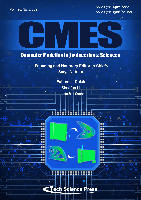
CMES-COMPUTER MODELING IN ENGINEERING & SCIENCES
Exploring the Intersection of Technology and EngineeringCMES-COMPUTER MODELING IN ENGINEERING & SCIENCES is a premier journal published by Tech Science Press, dedicated to advancing knowledge in the fields of computer science applications, modeling and simulation, and software engineering. With an impressive convergence of research from 2000 to 2024, this journal stands out as a vital resource for researchers, professionals, and students alike, fostering innovation and collaboration in computational methodologies. The journal currently holds a Q3 category ranking in multiple disciplines according to the latest metrics, including Scopus, which reflects its growing significance in the academic community. By providing a platform for high-quality research and open discourse, CMES aims to enhance the understanding of complex systems through effective modeling techniques and computational tools. Despite its current classification under open access, the journal remains a cornerstone for those looking to deepen their expertise in cutting-edge computational engineering and science.

IMA Journal of Management Mathematics
Exploring Mathematical Applications in Management ScienceThe IMA Journal of Management Mathematics is a distinguished publication that merges the realms of applied mathematics and its applications in management and economics, published by the esteemed Oxford University Press. With an ISSN of 1471-678X and an E-ISSN of 1471-6798, this journal has been a valuable resource since its inception, encompassing research disseminated from 1986 to present. It proudly holds notable quartile rankings including Q1 in Economics, Econometrics and Finance and Q2 across several related fields. The journal's commitment to advancing knowledge in areas such as management science, modeling and simulation, and operations research makes it essential reading for researchers, professionals, and students who seek to explore the integration of mathematical theories within management practices. Although not an open access journal, its high impact and widespread recognition in the academic community ensure that it remains a prominent platform for innovative research that influences both theory and practice.